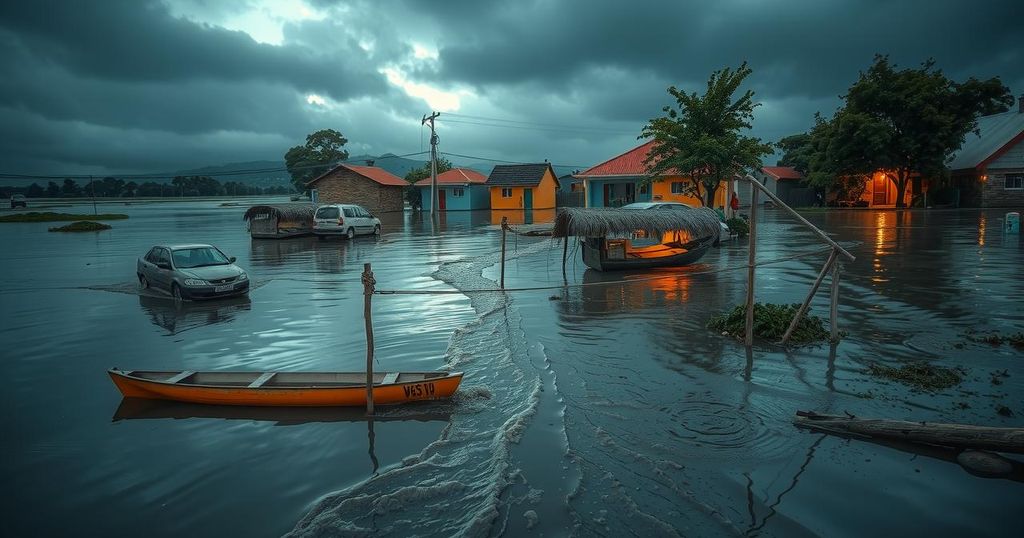Climate change exacerbated flooding across Africa in 2024, resulting in over 1,500 fatalities and displacing more than one million people. A recent report indicates that human-induced climate factors have intensified seasonal rains by 5-20 percent. Experts urge urgent action at the upcoming COP29 summit to combat the escalating risks of extreme weather events in the region.
Recent studies indicate that Africa is disproportionately affected by climate change, despite contributing a minimal amount of global greenhouse gas emissions. In 2024, increased rainfall, exacerbated by global warming, has led to severe flooding across several African nations, particularly in regions surrounding the Niger and Lake Chad basins. According to the World Weather Attribution (WWA) network, climate change linked to fossil fuel usage has heightened the intensity of seasonal rains by 5-20 percent this year, resulting in a humanitarian crisis. Dr. Izidine Pinto, a researcher at the Royal Netherlands Meteorological Institute and author of the study, noted that prolonged periods of intense rainfall have become commonplace in countries such as Sudan, Nigeria, Niger, Cameroon, and Chad. He warns that as global temperatures rise, especially with increments as slight as a fraction of a degree, the likelihood of extreme flooding will continue to escalate. Dr. Pinto calls for the upcoming United Nations COP29 climate summit, slated to convene in Azerbaijan, to prioritize efforts to transition away from fossil fuels. The flooding this year has tragically resulted in the deaths of approximately 1,500 individuals and has displaced over one million people in West and Central Africa, according to reports from the United Nations Office for the Coordination of Humanitarian Affairs (OCHA). Additionally, the heavy rains have overwhelmed existing dam infrastructure in Nigeria and Sudan, further exacerbating the crisis. WWA predicts similar intense rainfall events may become an annual occurrence if global warming reaches 2 degrees Celsius above pre-industrial levels, a scenario that could materialize by the 2050s. In Sudan, where conflict has displaced millions into flood-prone areas, researchers observed an increase in precipitation attributed to climate change. Joyce Kimutai, a researcher at the Centre for Environmental Policy at Imperial College in London, emphasized that although Africa’s contribution to carbon emissions is marginal, the continent is experiencing profound impacts from extreme weather events. Additionally, experts have indicated that the occurrence of flooding is also influenced by inadequate infrastructure, such as poorly maintained dams and insufficient early warning systems. Clair Barnes from the Centre for Environmental Policy cautioned, “This is only going to keep getting worse if we keep burning fossil fuels.”
The issue of global warming is a significant concern for many regions globally, with Africa facing some of the most severe consequences. The continent, while contributing only a small percentage to global carbon emissions, is severely impacted by climate change, leading to increased extreme weather events. Flooding, in particular, poses a significant risk to communities, infrastructure, and humanitarian efforts throughout Africa. This situation emphasizes the urgent need for international cooperation and effective climate policies to mitigate climate change’s impact on vulnerable regions, particularly in light of upcoming global climate summits.
In conclusion, the escalating impacts of climate change in Africa, particularly reflected in the unprecedented flooding events of 2024, demonstrate a pressing need for action. The disproportionate effects faced by African nations, which contribute minimally to global emissions, underscore the urgency for global leaders to prioritize climate change mitigation strategies, particularly at the forthcoming COP29 summit. Improved infrastructure, investment in early warning systems, and a decisive shift away from fossil fuel reliance are crucial steps in addressing these challenges.
Original Source: www.aljazeera.com






